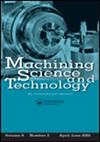Review on tools and tool wear in EDM
IF 2.6
4区 工程技术
Q2 ENGINEERING, MANUFACTURING
引用次数: 12
Abstract
Abstract Electric discharge machining (EDM) is a nontraditional machining process based on the thermal erosion of the electrically conductive workpiece and tool electrodes. The product cost manufactured by the EDM process mainly depends on the tooling cost, which comprises the cost of tool material, tool fabrication, and tool maintenance. The properties of tool material affect the machining performance parameters like material removal rate (MRR), tool wear rate (TWR), and surface roughness. The performance parameters are also influenced by the tool geometry, tool fabrication method, and the way by which both tools and workpiece interact with each other. In the EDM process, tool wear is difficult to avoid and high TWR decreases the accuracy of the machined parts. Therefore, to obtain the desired accuracy it is necessary to calculate TWR and provide wear compensation. The tool electrode fabrication method also decides the TWR. Tool electrodes are generally manufactured by metal forming techniques like forging and drawing, other than that, powder metallurgy, additive manufacturing are also being used. The process performance of the tool can be improved by cryogenic treatment and coating of the tool electrodes. This review provides the literature survey about the different types of tools used in the EDM process, methods of fabrication, tool wear types; measurement and compensation techniques.电火花加工中刀具与刀具磨损的研究进展
摘要电火花加工(EDM)是一种基于导电工件和刀具电极热侵蚀的非传统加工工艺。电火花加工制造的产品成本主要取决于刀具成本,刀具成本包括刀具材料成本、刀具制造成本和刀具维护成本。刀具材料的性能影响着材料去除率(MRR)、刀具磨损率(TWR)和表面粗糙度等加工性能参数。刀具几何形状、刀具制造方法以及刀具和工件相互作用的方式也会影响刀具的性能参数。在电火花加工过程中,刀具磨损是难以避免的,高TWR降低了加工零件的精度。因此,为了获得期望的精度,有必要计算TWR并提供磨损补偿。刀具电极的制造方法也决定了TWR的大小。工具电极通常通过锻造和拉伸等金属成形技术制造,除此之外,粉末冶金、增材制造也在使用。通过对刀具电极进行低温处理和涂层处理,可以提高刀具的工艺性能。本文综述了电火花加工中使用的不同类型的刀具、加工方法、刀具磨损类型的文献综述;测量和补偿技术。
本文章由计算机程序翻译,如有差异,请以英文原文为准。
求助全文
约1分钟内获得全文
求助全文
来源期刊

Machining Science and Technology
工程技术-材料科学:综合
CiteScore
5.70
自引率
3.70%
发文量
18
审稿时长
6 months
期刊介绍:
Machining Science and Technology publishes original scientific and technical papers and review articles on topics related to traditional and nontraditional machining processes performed on all materials—metals and advanced alloys, polymers, ceramics, composites, and biomaterials.
Topics covered include:
-machining performance of all materials, including lightweight materials-
coated and special cutting tools: design and machining performance evaluation-
predictive models for machining performance and optimization, including machining dynamics-
measurement and analysis of machined surfaces-
sustainable machining: dry, near-dry, or Minimum Quantity Lubrication (MQL) and cryogenic machining processes
precision and micro/nano machining-
design and implementation of in-process sensors for monitoring and control of machining performance-
surface integrity in machining processes, including detection and characterization of machining damage-
new and advanced abrasive machining processes: design and performance analysis-
cutting fluids and special coolants/lubricants-
nontraditional and hybrid machining processes, including EDM, ECM, laser and plasma-assisted machining, waterjet and abrasive waterjet machining
 求助内容:
求助内容: 应助结果提醒方式:
应助结果提醒方式:


